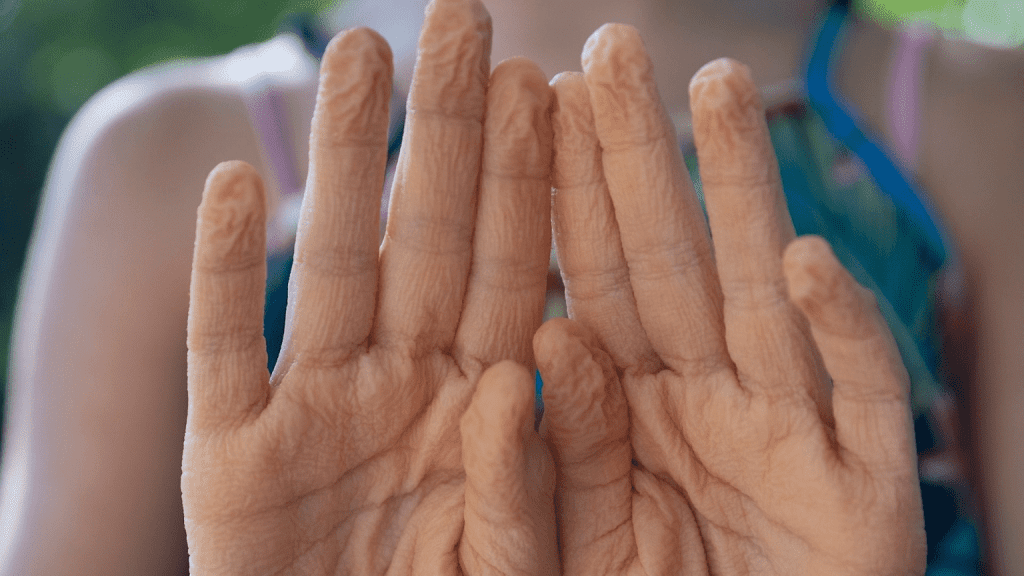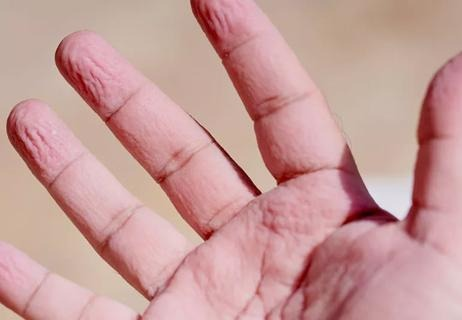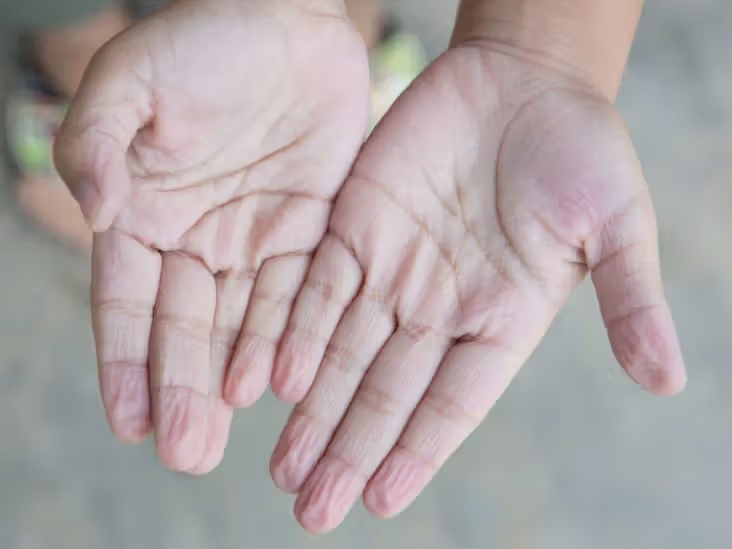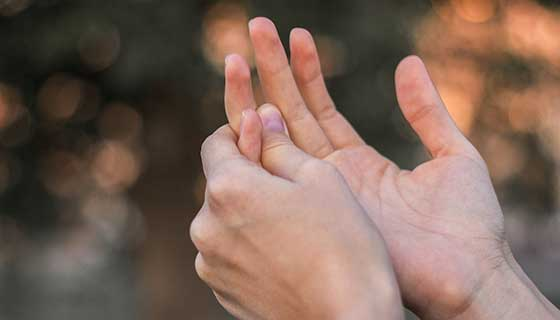Have you ever noticed how your fingers and toes get all wrinkly after spending too much time in water? This odd phenomenon has puzzled many, but there’s actually a fascinating biological reason behind it. Let’s dive into why our fingers prune up, what it says about our health, and some tips to keep your skin looking smooth and healthy.

Why Do Fingers Wrinkle in Water? The Biological Explanation
When your fingers soak in water for an extended period, your skin begins to wrinkle. While it might seem like the water is simply absorbing into your skin, the real answer is a bit more complex and rooted in evolution. Scientists believe that finger wrinkling is an automatic response triggered by the nervous system.
When your hands or feet are submerged in water, the nerves in your body send signals that cause the blood vessels in your fingertips to constrict. This process, called vasoconstriction, reduces the volume of the fingertips, causing the skin to shrink and create those distinctive wrinkles. Why does this happen? Evolution suggests that wrinkling might give us a better grip on wet or submerged surfaces, much like treads on tires improve traction.
Is Finger Wrinkling a Health Concern?
Most of the time, wrinkling is a harmless, temporary reaction. As soon as you remove your hands from water and your skin dries off, the wrinkles smooth out. For most people, this effect is short-lived and nothing to worry about.
However, if you notice that your fingers or hands wrinkle excessively without water exposure or take an unusually long time to smooth out, it might be worth consulting a doctor. Conditions like dehydration, Raynaud’s phenomenon, or even some nervous system disorders can cause similar skin effects. But for the average person, wrinkling in water is just a quirky and harmless response from the body.
How to Care for Your Hands After Water Exposure
Even though water-induced wrinkling isn’t dangerous, prolonged exposure to water can dry out your skin. Here are some easy ways to keep your hands feeling soft and healthy after they’ve been soaked.
- Moisturize Regularly: After spending time in water, applying a moisturizer can help your skin retain its natural oils. Look for lotions with vitamins like E and B5, along with aloe vera and hyaluronic acid, which hydrate and soothe skin.
- Try Natural Hand Masks: Treating your hands to a natural mask can help restore moisture and make them feel softer. Cucumber, yogurt, coconut oil, and honey are fantastic natural ingredients that are gentle on your skin and provide nourishing benefits.
- Exfoliate Gently: Exfoliation can remove dead skin cells and improve the look of your hands. A simple homemade scrub with lemon juice and sugar or salt can give your hands a fresh feel. After exfoliating, don’t forget to apply a good moisturizer to seal in hydration.
Preventative Measures: How to Reduce Water-Related Wrinkling

If you frequently find your hands wrinkling due to daily activities like washing dishes or doing laundry, there are some preventative steps you can take to minimize the impact.
- Use Rubber Gloves: When washing dishes or doing tasks that involve prolonged water exposure, slip on a pair of rubber gloves. This not only protects your hands from water but also shields them from harsh detergents.
- Limit Hot Water Exposure: Hot water can strip away natural oils, leaving your hands dry and more prone to wrinkles. Try to wash your hands or do household chores with lukewarm water instead.
- Switch to Natural Soaps: Traditional dish soaps and detergents contain chemicals that can be harsh on your skin. Consider switching to natural or gentle formulas that are less likely to cause dryness.
- Eat a Balanced Diet Rich in Vitamins and Fiber: A diet full of fruits and vegetables can do wonders for your skin. Vitamins like A, C, and E help maintain healthy skin and keep it looking smooth and vibrant.
- Moisturize Daily and Use Sunscreen: Keeping your hands hydrated is essential for preventing dryness. Applying sunscreen can also protect your skin from the sun’s damaging effects, which can contribute to dryness and premature aging.
Could Wrinkled Hands Be a Sign of Health Issues?
While wrinkling from water exposure is typically benign, certain health issues can also cause your skin to wrinkle or dry out. For example, dehydration is a common cause of dry skin, which may make wrinkles more prominent. Other conditions, such as Raynaud’s phenomenon (a disorder affecting blood flow to certain parts of the body) or some autoimmune disorders, might cause similar skin symptoms.
If you notice that your hands or fingers wrinkle easily without water exposure, consult with a healthcare professional to rule out any underlying conditions. Understanding the cause can help you take the right steps toward maintaining smooth, healthy skin.

Wrinkling as an Evolutionary Advantage?
The intriguing part of this whole phenomenon is that wrinkled skin on your fingers might actually serve a purpose. Studies suggest that the wrinkles create channels for water to escape, giving our hands and feet better grip on wet surfaces. Imagine walking barefoot on a slippery rock or holding onto a damp object—those wrinkles might just help you keep a firm hold.
So, while wrinkled fingers might seem like a mere reaction to water, evolution may have built it into our bodies to help us navigate wet environments more effectively. This natural “traction control” system could have been an advantage for our ancestors in wet or slippery conditions, allowing them to grip surfaces better.
Why Some People’s Skin Wrinkles Faster Than Others

Ever wonder why some people’s fingers wrinkle faster in water than others? There are a few factors at play here, such as age, genetics, and skin type. Older adults, for example, may find their skin wrinkles more easily due to a decrease in natural oils and collagen over time. Similarly, people with naturally dry or thin skin may experience faster wrinkling than those with oilier or thicker skin.
Environmental factors can also contribute. For instance, if you’ve recently been in a dry or cold climate, your skin may be more prone to wrinkling in water because of a lack of moisture. Although individual differences exist, the wrinkling phenomenon generally affects everyone to some degree and is usually nothing to worry about.
Conclusion: Embrace the Wrinkles, They’re Only Temporary
Wrinkly fingers from water exposure are a common, harmless response that your body has developed over time. Rooted in evolutionary biology, this reaction could even give us an edge in wet environments. Most importantly, water-induced wrinkling isn’t a health concern for most people and can even serve as a reminder to keep your hands moisturized and cared for.
The next time you notice your fingers or toes pruned up after a bath or swim, remember that it’s just your body doing what it’s designed to do. Take a few moments to give your hands some love with a good moisturizer or mask, and appreciate the fascinating biology at work.


